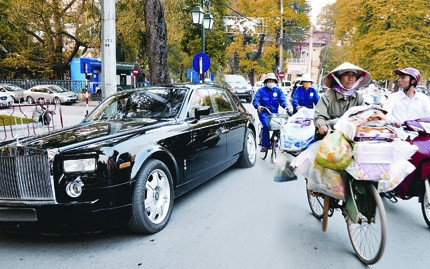Vietnam strives to reduce social inequality
Vietnam’s economic model in the post-renewal process has yielded high growth rates and helped the majority of the population escape poverty. But increasing social inequality has become an issue of concern for authorities.
 |
| Photo for illustration |
Vietnamese people’s average income has increased significantly over the past several decades, from US$100 in 1990 to US$2,300 in 2015.
More than 30 million people have escaped poverty and the economy records an average annual growth rate of 5%-6%. Despite effective social security policies, the gap between the rich and the poor in Vietnam is widening.
Reducing inequality, from words to action
Tackling inequality is crucial in building a democratic and civilized society.
“We are doing our utmost to curb inequality, particularly in healthcare, education and policies for the poor. A lot has been done to preserve ethnic group languages and cultures. I think when ethnic people are empowered and given confidence, their lives will be much better and their social status will improve”, said Ngo Truong Thi, Director General of the National Office for Poverty Reduction of the Ministry of Labor, Invalids and Social Affairs.
Poverty reduction is an effective way to deal with social inequality. For example, a project funded by the UNDP and the Irish Embassy in Vietnam from 2012 to 2015 helped residents in 8 provinces improve their awareness, expand innovative models, and promote the role of the community and individuals in poverty reduction.
“We have created a model to assist poor people’s livelihoods. Notably, the creativity and self-reliance of local authorities and poor people have been brought into full play”, said Pham Truong Tho, Vice Chairman of the People’s Commitee of Quang Ngai, a project beneficiary.
Consistent reform to narrow the inequality gap
However, Babeth Ngoc Han Lefur, Oxfam Country Director in Vietnam, says that poverty reduction projects are not enough.
She suggests that Vietnam apply advanced policies on state governance, taxation, public spending and services, employees’ rights, and people’s participation to close the gap between the rich and the poor.
“Vietnam is focusing on institutional reform to ensure transparency and effectiveness in macro-economic policies, particularly in investment. It’s important to maintain successful policies toward promoting empowerment, decentralization, and people’s participation”, said Director General Ngo Truong Thi.

